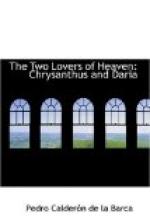“The Guardian”, in its review of the same volume.
THE SORCERIES OF SIN.
An Auto.
“The central piece, the ‘Sorceries of Sin’, is an ‘Auto Sacramental’, or Morality, of which the actors represent Man, Sin, Voluptuousness, etc., Understanding, and the Five Senses. The Senses are corrupted by the influence of Sin, and figuratively changed into wild beasts. Man, accompanied by Understanding and Penance, demands their liberation and encounters no resistance; but his free-will is afterwards seduced by the Evil Power, and his allies reclaim him with difficulty. Yet the plan of the apologue is embellished with many ingenious conceits and artifices, and conformed in the leading circumstances with an Homeric myth—the names of Ulysses and Circe being frequently substituted for those of the Man and Sin”.
“The Saturday Review” on “Mac-Carthy’s Three Plays of Calderon”.
BELSHAZZAR’S FEAST.
An Auto.
“The first auto translated is ‘Belshazzar’s Feast’, a fortunate selection, for it is probably unsurpassed in dramatic effect and poetic description, and withal is much less encumbered with theology than most others”.
From an article in “The New York Nation”, by a distinguished professor of Cornell University, on “Mac-Carthy’s Translations of Calderon”.
THE DIVINE PHILOTHEA.
An Auto.
“‘The Divine Philothea’, probably the last work of the kind written by Calderon, and as such worthy of attention, inasmuch as it is the composition of an old man of eighty-one, is conceived with much boldness and executed with marvellous skill. No fewer than twenty personages are represented on the stage, and these have their several parts allotted to them with great discrimination, ingenuity, and judgment. The Senses, the Cardinal Virtues; Paganism and Judaism; Heresy and Atheism; the Prince of Light and the Power of Darkness, figure amongst the characters”.
“The Bookseller”, June 29, 1867, on Mac-Carthy’s “Mysteries of Corpus Christi (Autos Sacramentales), from the Spanish of Calderon”.
THE TWO LOVERS OF HEAVEN.
A Drama.
“Of these ‘The Wonder-working Magician’ is most celebrated; but others, as ‘The Joseph of Women’, ‘The Two Lovers of Heaven’, quite deserve to be placed on a level if not higher than it. A tender pathetic grace is shed over this last, which gives it a peculiar charm”.
Archbishop Trench.
Calderon’s Autos Sacramentales, or Mysteries
of Corpus Christi. Duffy:
Dublin and London, 1867.
From “The Irish Ecclesiastical Record”.




